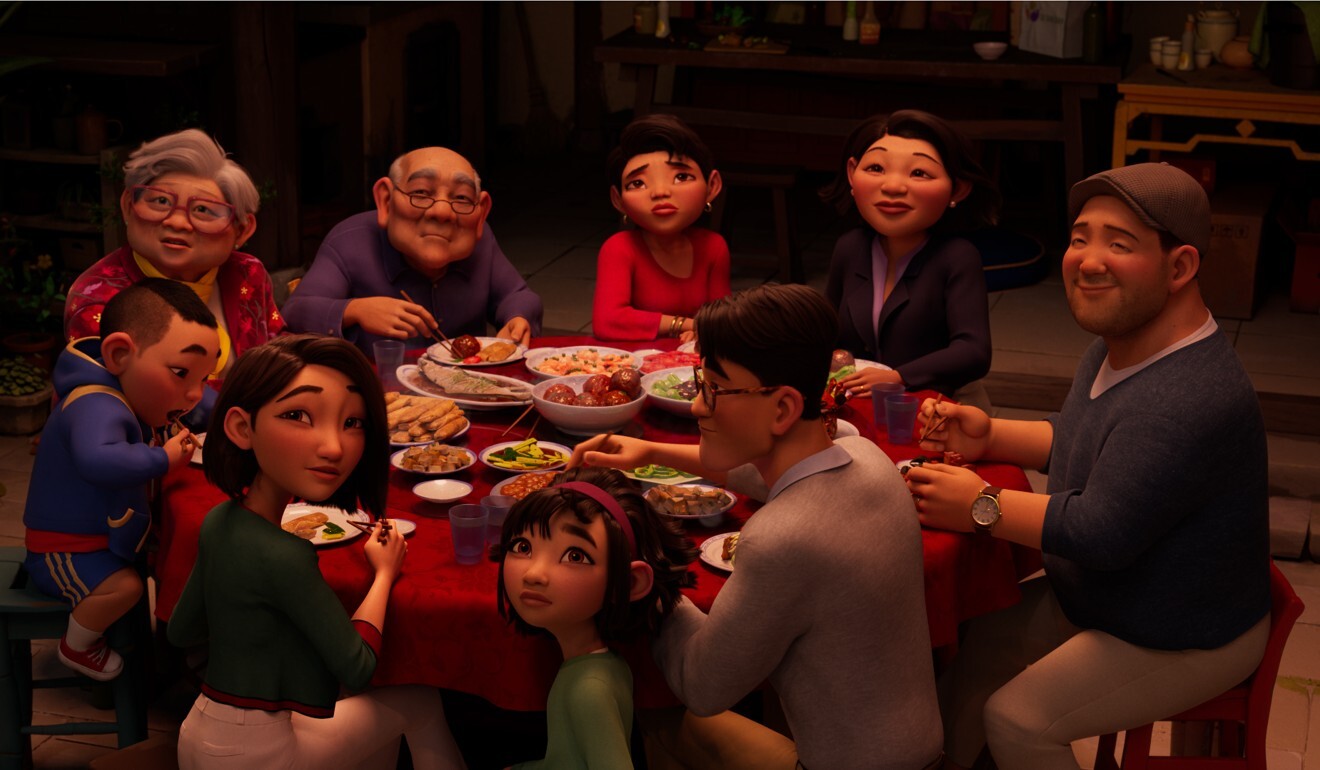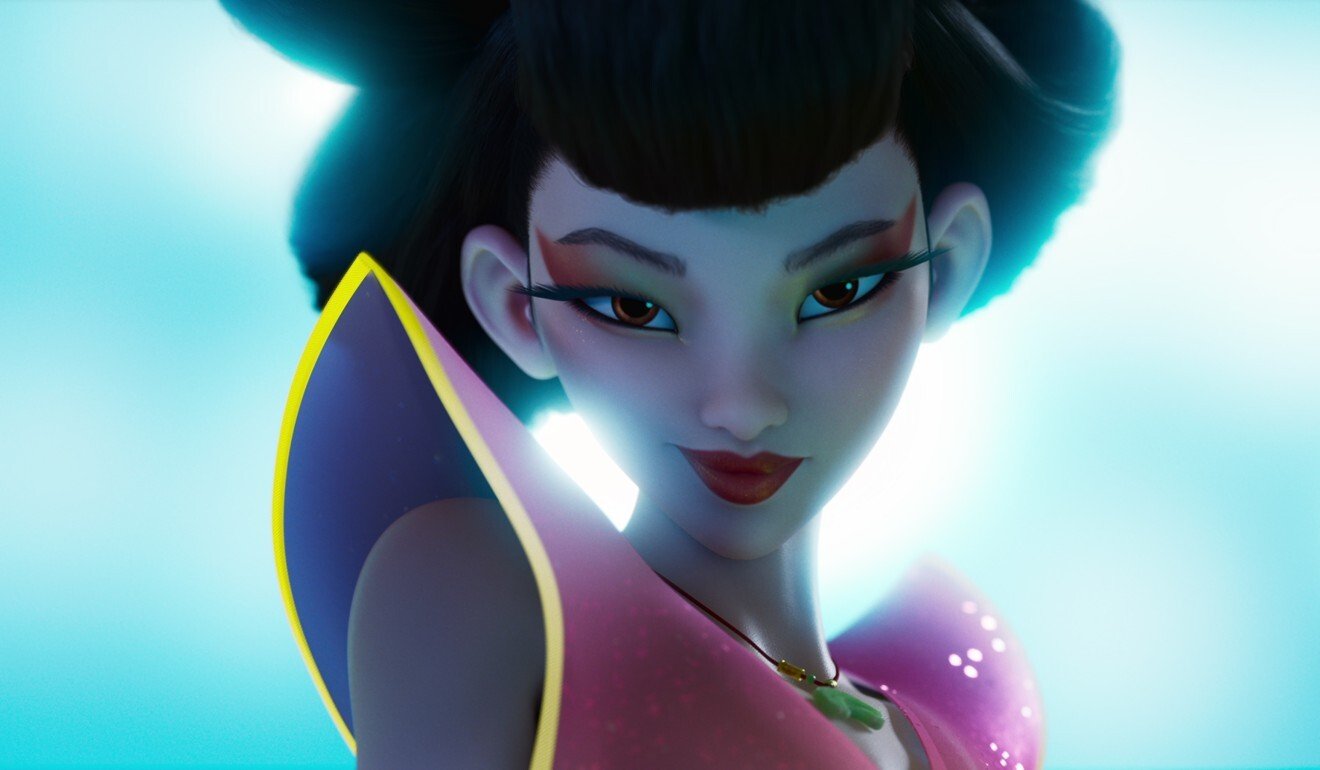
Netflix’s Over the Moon praised in China but bigger box-office bomb than Disney’s Mulan
- While both films feature Chinese stories and all-Asian casts, Over the Moon is being applauded for handing Chinese culture better than the live-action Mulan
- The US-China co-production has received little attention in China, earning less than US$1 million at the box office before streaming on Tencent Video and iQiyi
Reviews have been much kinder to Over the Moon, though, which was released globally on Netflix on October 23 and got a theatrical release in China on the same day. Viewers praised the film’s animation and its treatment of Chinese culture. However, the story failed to excite audiences and the film fizzled out at the cinema with just 5.72 million yuan (US$864,000) in its first three weeks, according to movie ticketing platform Maoyan.
Over the Moon tells the story of a Chinese girl in her early teens named Fei Fei. Remembering the story of the Moon goddess Chang’e told to her years earlier, she sets out to build a rocket to the Moon and prove the goddess really exists.
It was co-produced by Netflix and Pearl Studio, a Shanghai-based animation studio that previously worked with DreamWorks Animation on Kung Fu Panda 3 and Abominable. The film also garnered some early attention because of the star power behind it.
Former Disney animator Glen Keane, known for his character work on hit films like Beauty and the Beast and Aladdin, directed the film. It also has an all-Asian cast with big names such as John Cho, Sandra Oh, Ken Jeong and Hamilton’s Phillipa Soo, who voices Chang’e. Yet none of these actors are particularly well-known in China.
Among those who took a chance on the film, many praised the animation’s detailed depiction of Chinese cultural elements, such as using the Nanxun water town as inspiration for some of the film’s scenery.
“It’s fun to see Nanxun Old Town and a Chinese family from foreigners’ perspective,” one person wrote on the movie review site Douban, giving the film three stars out of five. “Mooncakes, hairy crabs, Phoenix Legend … very down-to-earth.”
Phoenix Legend is a Chinese pop music duo whose songs are widely used for square dancing, a popular exercise routine among China’s elderly population.
“Compared with [the studio’s] previous film Abominable, it more accurately depicts the details of Chinese people’s lives,” someone else wrote on Weibo. “[From] how family members are seated when eating together, the Mid-Autumn dishes and the texture of the food, square dancing on the roadside, the background music and so on, you can tell that it put in the time and energy.”

Despite praise for the animation, though, the story failed to impress. Critics said it was childish and lazily adheres to a formula more associated with Disney films, such as giving the main character a deceased parent. In China, people also called the story cluttered and bland.
There was also another potential problem that had nothing to do with the film itself: the release date.
“If it had a timely release during the Mid-Autumn Festival, it probably wouldn’t have been so disregarded,” a Douban user wrote.
Chang’e is typically celebrated during the Mid-Autumn Festival, but the holiday, which follows the lunar calendar, fell on October 1 this year. By the time Over the Moon arrived three weeks later, celebrations were done.
However, viewers did not seem to mind the creative liberties taken with Chang’e. This is in contrast to the scathing rebuke Disney’s Mulan received across the internet for its handling of Chinese culture.
How Netflix animation of a Chinese myth stays true to its roots
While the first act of the film is more grounded, the tone and aesthetics take a sharp turn once Fei Fei makes it to the Moon and Chang’e enters the picture. The goddess is depicted as a sassy, dancing diva who some likened to famous pop idols. Some people online jokingly referred to her as “the Moon’s Jolin Tsai”, referencing the Mandopop star from Taiwan.
The Moon kingdom Lunaria is also depicted as a gaudy land full of popping colours. There, Chang’e governs luminous, multicoloured, blobby creatures formed from the goddess’s tears.
These things have nothing to do with the original legend, but some people appreciated the novelty.
“Chang’e’s cool-girl image and the candy-coloured Moon were at first truly hard on the eyes, but they feel surprisingly OK after I finished the movie,” one viewer said on Douban. “Cool-girl Chang’e is a creative idea.”
“Chang’e’s appearance toppled people’s impression of her being composed and elegant, and that is innovative,” another Douban user wrote.

While reception to Over the Moon has been slightly favourable, with a 6.5 rating out of 10 on Douban, the film cannot match the marketing power of Disney. So far, Over the Moon has attracted about 2,700 reviews on the site compared with more than 224,000 reviews for Mulan, which has a 5.0 rating.
As a Netflix co-production, Over the Moon debuted directly on the streaming service in most markets around the world. But Netflix is blocked in China, hence the theatrical release.
This is also what happened with Mulan, which debuted on Disney+ in most countries but got a theatrical release in China. The US$200 million blockbuster was not originally meant to debut online, though, with the release being changed after the Covid-19 pandemic delayed it for months. It also starred Liu Yifei, a well-known actress in China, alongside other household names in the country.
So despite poor reviews and an industry hit hard by the pandemic, Mulan still took in more than US$40 million at the box office in China.
Disney’s Mulan compared with Western Chinese food
Most of Over the Moon’s weak box office take in the country came from its first weekend, Maoyan data shows. By October 30, the film was already available on Tencent Video and iQiyi, China’s two biggest video streaming platforms.
Over the Moon is the first film Pearl Studio has worked on without DreamWorks. The studio started in 2012 as Oriental DreamWorks, a DreamWorks joint venture with Chinese investors. In 2018, the studio was bought out by China’s CMC Capital Partners.
The studio had better luck with Abominable in China last year, pulling in US$21.8 million at the box office. The film follows a teenage girl in modern China who encounters a yeti on her roof before embarking on a quest to reunite the creature with his family.
Succeeding both inside and outside China remains a difficult feat for many films. But despite its paltry box office earnings, Over the Moon might be doing a better job than most at appealing to both foreign and Chinese tastes.
“The earth [ in Over the Moon] is used to show Chinese culture, and the Moon is used to blend in Western characteristics. It’s an appropriate choice for combining Chinese and Western [culture],” one person wrote in a Douban review. “At least it’s not as awkward as the live-action Mulan.”

